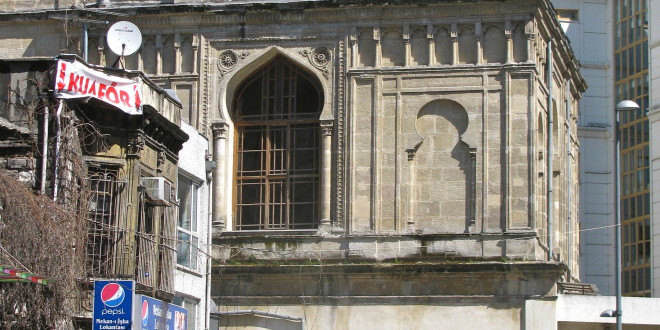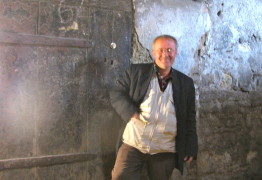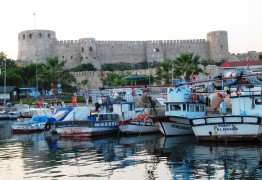Sankar left this morning for nine days in Minnesota and, with my lightened summer work schedule, I am wondering how to fill a lot of free hours.
I had a plan for today (Saturday), which I am executing. In the morning I headed downhill to the Bosphorus and jumped on a bus heading south along the sea road. Weekend mornings are delightful here; Turks tend to get up late, and so buses are half empty and the roads are blessedly traffic-free. Ten minutes later I was at Kabatash, where the big cruise ships dock, and also the start of the tram. I hopped on the tram using the same electronic chip I used for the bus (it is also good for ferries across the Bosphorus and for the spanking new subway system), and soon arrived at the Spice Bazaar, located right on the Golden Horn.
My idea was to visit the Rustem Pasha Mosque with its ornate old ceramic tiled walls, and then buy some seasonings at the bazaar. I knew I’d have to navigate a maze of tiny streets, but thankfully, mosques tend to announce themselve with high-domed roofs and minarets. As soon as I exited the tram, I saw the historic site I was looking for.
Getting to the mosque was perhaps more interesting than the mosque itself. In the labyrinth behind the spice bazaar are all sorts of tiny shops that sell just about everything you can imagine. Many cater to the restaurant trade: I saw shops specializing in knives; shops with paper goods—cups, napkins, straws, tablecloths—in large quantities; and shops full of specialized cooking implements and extracts. I picked up a heavy bundt pan with a non-stick coating, and discovered it was also a springform pan – the sides came off. I considered it for a moment, but since I don’t bake a lot of cakes, I put it down.
One of the expatriates I’ve met this year is Joy, who used to be a pastry chef at one of Washington D.C.’s finest restaurants. She told me she goes to this neighborhood to buy large bars of high-quality cooking chocolate. I also saw foil baking pans of all sizes, large rolls of plastic wrap, roasted coffee beans in thigh-high, open burlap bags, and a store selling bread baskets, including some lined with linen like what the neighborhood kebab shop uses. I bought one, tan and straw-like in appearance, but actually plastic.
But it wasn’t all cooking stuff. Some shops sold electric goods: compact fluorescent bulbs, outlet strips and surge protectors. Yet other stores offered huge, 4-foot-high rolls of bubble wrap, pieces of astro turf, rugs and mats of all sizes, some announcing “welcome,” in English. A number of little stores had stacks of gift bags out in front. Small rolls of children’s gift wrap peeked out of boxes, but the designs were outdated. So far I have seen virtually NO wrapping paper here in Turkey that would appeal to anyone over age 7.
On my way out, carrying the basket and a new outlet strip, I paused by a table that held a variety of fresh apricots (I didn’t know different types of this fruit existed). An older man immediately got up from drinking tea with his neighboring shopkeepers, came over and asked me how many I wanted. Turks always cut to the chase and I’m either so amiable or so easily pushed that I give in. I pointed at the yellowest of the piles and asked for a half kilo, and he told me they were special apricots from Van, not far from the Iranian border. Thus my expedition ended, as usual with warm feelings toward those who had helped me and delight over seeing something new.
Why, you might be asking, am I struggling to fill time when I’ve been in country for a year? Well, our social life is a bit dismal. First of all, it’s summer and some people are away. Our Swedish friends leave next Friday and won’t return to Istanbul until September 3. Our Texas friends (I know, but they’re really nice) are in the States for the birth of a grandchild. Second, when I started teaching here, my friend Felicia warned me, “you’re going to have a terrible social life.” She was right. I no longer have time to meet fellow expatriates for teas and long lunches.
Felicia herself is down in Antioch for a week with her high-school-English-teacher husband who has brought students there on a service learning project. That town is not far from the Syrian border, where hundreds of refugees are amassing. The other day, Syrian tanks came right up to the Turkish border in an effort, they claimed, to catch “terrorists.” I don’t know how this situation is going to be resolved. Turkish diplomats are working hard, but the Assad family seems intransigent.
What about work friends? Well, most live on the Asian side, a barrier to getting together on traffic-filled weekends. The majority are Turkish and though delightful, they are quite busy with their families and extended families. We do have occasional work-related social events, but less so in summer.
Another barrier to making friends here is that we don’t have children here, ours being grown. And yet another factor is interesting: most expatriates of our age have extremely close ties with friends and family back home, wherever that might be. Since we’re in such a fabulous city, we all welcome a constant stream of visitors. This is delightful, but I wish we could put our visitors on the same schedule. Sankar and I emerge from weeks of kid visits and/or friend visits only to find that our expatriate friends are busy with their visitors.
Tough sometimes, but in the larger sense, exactly what we want. When this adventure is over, we will return to the people we love the most, content that many of our relationships have been strengthened during our years away.
One thought on “Behind the Spice Bazaar”
Comments are closed.





HI Sue! Glad you browsed around one of my favorite spots in Istanbul. I recently bought a ton of spices at the bazaar. =)
We are here off an on this summer, with visitors arriving on July 14th. I generally have lots of free time to socialize if we aren’t traveling. Let me know. Cheers!